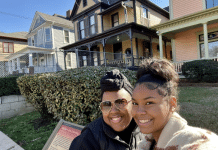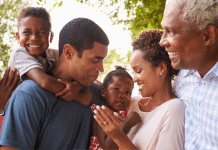I am black. My husband is white. Before becoming a mom, I always wondered what my kids would look like. We now have two beautiful mixed children. As we are raising them, I am beginning to wrestle with questions about their identity. How will the world see them? How will they see themselves? The answers to those questions are not so black and white.
Growing up, I was taught that because of my skin color I would have to work twice as hard to get the same recognition as my white counterparts. This lesson came from my parents and grandparents who lived through the Civil Rights Era. They faced injustice, persecution, and segregation first hand. Their experience taught them some hard lessons. Those lessons were passed down to me. In some ways their words and experiences fueled me. They led me to work hard to get where I am today. Yet, that same advice also crippled me. I feel like I have often moved through life carrying such high expectations for myself, only to be exhausted by the fact that even my best efforts may not be enough.
Raising mixed children is harder than I thought it would be. I often wonder if my kids will have experiences like me or the generations before them because of their appearance. I also imagine them experiencing persecution from both sides of the fence. Maybe they will not be “black enough” or “white enough.” Maybe they will feel forced to choose one race to identify with. I am uncertain of how I will help them navigate the nuances of race and racism. I want them to be knowledgeable of our history. I want to protect them from the reality that they may be treated differently simply because of how they look. I also do not want to continue to perpetuate the feeling of otherness. But, how else do I prepare them for the world we live in today? How do I help them understand that some people will see them as different?
We started to have conversations with my preschooler about being mixed around age two. Books have been helpful in facilitating those talks. Our two favorites are “I Am Mixed” by Garcelle Beauvais and Sebastian A. Jones and “Mixed Me” by Taye Diggs. Both books celebrate the uniqueness of mixed children and include images that my kids can relate to. They can see themselves represented in these stories.
I do not know how our conversations about race will evolve, simply because it is not so black and white. For now, I will continue to read books to empower my kids. I will continue to speak into their character, so they know they are more than their complexion. I will continue to place them in a community with people who look like them and those who do not. I want my children to be proud of their honey brown skin and curly hair. But, when they look in the mirror, I hope they see more than that. I hope they also see strength, beauty, dignity, kindness, confidence, and love.









